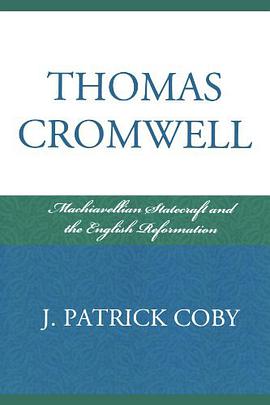

具体描述
Thomas Cromwell, chief architect of the English Reformation, served as minister of Henry VIII from 1531 to 1540, the period during which more political and religious reform was accomplished than at any other time in Henry's thirty-seven-year reign. Thus the momentous events of the 1530s are generally (but not universally) attributed to Cromwell's agency. Cromwell has been the subject of close and continuous attention for the last half century, with positive appraisal of his work and achievements as the scholarly norm. In this classroom biography_the first in a generation and the only one now in print_that judgment is largely accepted, though it is combined with earlier and more critical assessments that view Cromwell as a disciple of Machiavelli. One distinguishing feature of this study is its overview of Machiavellian thought, along with its overview of Marsilian thought. Marsilius of Padua, fourteenth-century political philosopher and author of Defensor Pacis, is widely recognized as the source of Cromwell's reformation ideas; but nowhere is Marsilius explicated. The same is true of Machiavelli_never explicated though said to be (by Reginald Pole, cousin of Henry and cardinal of the church) the source of Cromwell's ideas on statecraft. A second distinguishing feature of the book is its inclusion of an introductory chapter that situates Cromwell in the sixteenth century and shows his connection to important events, characters, and ideas. Thus, while the book is a biography, its focus is broader and its uses more various.
作者简介
目录信息
读后感
评分
评分
评分
评分
用户评价
这本书的叙事节奏简直让人欲罢不能,作者对历史细节的把握精准到令人叹为观止。我仿佛能闻到都铎王朝宫廷里那些昂贵香料和隐秘阴谋的气味。特别是对于那些错综复杂的政治斗争的描绘,丝丝入扣,让人完全沉浸其中,几乎忘记了自己是在阅读文字。书中对人物心理的刻画更是深刻入骨,每一个决策、每一次眼神的交汇,都充满了张力与背后的权谋算计。我尤其欣赏作者如何巧妙地处理历史的“灰色地带”,没有简单地将人物塑造成绝对的好人或坏蛋,而是展现了他们在特定历史洪流下的挣扎与人性光辉的闪现。那种历史的厚重感和命运的无常感,通过作者精妙的笔触,直击人心深处。读完后,我需要花上好一会儿才能从那个波谲云诡的年代抽离出来,回味无穷。这种将历史还原为活生生的人和事的功力,是许多历史小说望尘莫及的。
评分这本书的结构安排非常巧妙,它采用了多视角的叙事方式,使得我们能够从不同社会阶层的人物眼中,拼凑出那个时代的全貌。我喜欢这种“碎片化”的真实感,它避免了单一主角的局限性,让整个历史图景显得更加立体和丰满。不同人物的命运线索在关键节点交织、碰撞,那种宿命感和偶然性交织在一起,让情节充满了戏剧张力。特别是其中几段场景切换的运用,从宏大的议会厅瞬间拉到阴暗的后巷,视觉冲击力极强,节奏感把握得如同专业电影剪辑一般流畅自然。读完之后,我感觉自己像是在一部制作精良的系列剧中,体验了一段波澜壮阔的旅程。
评分我最欣赏这本书的地方在于它对社会结构和权力运作逻辑的深刻洞察。它不仅仅是在讲述一个过去的故事,更像是在解剖一个永恒的人类困境:如何在既定的规则下生存,以及为了向上爬,人愿意付出多大的代价。书中的对话设计尤为精彩,充满了潜台词和试探,每一次君臣、友朋之间的交谈,都像是一场精妙的剑术比拼,表面风平浪静,实则暗流涌动。作者对中层阶级的生存状态描绘得尤为传神,他们夹在上层贵族的奢靡与下层百姓的困苦之间,既渴望向上攀附,又害怕跌落深渊,那种焦虑感被刻画得入木三分,让我深有共鸣。
评分这本书的语言风格极其华丽,初读时,我甚至需要放慢速度,细细咀嚼那些富有韵律感的长句和古典的词藻。它给我的感觉,更像是在阅读一幅用文字精心编织的挂毯,每一个细节,无论是环境的描摹还是角色的衣着,都带着一种古典主义的精致与繁复。虽然偶尔会觉得叙述略显冗长,但正是这种细致入微的铺陈,构建了一个无比真实且令人信服的时代背景。作者似乎对文字有着近乎偏执的追求,用词考究,使得阅读体验充满了仪式感。对于那些追求文学美感甚于纯粹情节推进的读者来说,这本书无疑是一场盛宴。我尤其喜欢作者在描述自然景象和室内陈设时所展现出的那种细腻的感官体验,仿佛触摸到了那个时代物品的质地。
评分坦白说,这本书的开篇略显沉闷,我差点就因为那些繁复的家族谱系和冗长的背景介绍而放弃。然而,一旦熬过了最初的门槛,剧情的深度和广度便豁然开朗。它展现了一个宏大叙事下,小人物如何被时代的巨轮碾压或推动的无力感。这种史诗般的尺度感,让人不禁思考个体在历史面前的渺小。作者似乎并不急于提供一个皆大欢喜的结局,而是忠实地记录了历史的残酷面。这种不回避黑暗、不矫饰现实的态度,令我非常敬佩。它不是那种读起来轻松愉快的消遣之作,它更像是一次严肃的智力挑战和情感上的洗礼,迫使你不断地质疑和审视书中所呈现的道德困境。
评分 评分 评分 评分 评分相关图书
本站所有内容均为互联网搜索引擎提供的公开搜索信息,本站不存储任何数据与内容,任何内容与数据均与本站无关,如有需要请联系相关搜索引擎包括但不限于百度,google,bing,sogou 等
© 2026 book.wenda123.org All Rights Reserved. 图书目录大全 版权所有



















![FUDGE (ファッジ) 2009年 03月号 [雑誌] pdf epub mobi 电子书 下载](https://doubookpic.tinynews.org/4b79a4ccf311420c7b9a2221fcf62c5d82c787edbbd89614b0f7196a93dd468d/s3710344.jpg)
